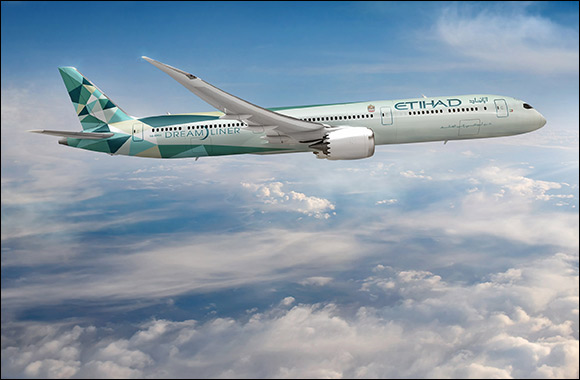• Despite impact of Covid19 on global aviation, Etihad’s Greenliner programme implemented key sustainability initiatives throughout 2020 and 2021 to test and develop long term decarbonisation solutions for the entire industry
• Clear and ambitious path forward with 2025, 2035 and 2050 emissions targets
• Introduction of Sustainable50 programme to expand Etihad’s sustainability strategy to become world’s most comprehensive industry-wide testing and innovation programme.
• Achieved 2020-2021 sustainability targets and reduced greenhouse gas emissions by 56 percent since 2018
• Committed to reduction target in aviation’s first sustainability-linked sukuk, and raised US$1.2 billion in the first sustainability-linked loan (SLL) tied to environmental, social and governance (ESG) targets in global aviation
Abu Dhabi, UAE – Etihad has released its Sustainability Report 2020-2021, outlining the impact the company has had on the environment, and detailing its Sustainability strategy, represented by the Etihad Greenliner and Sustainable50 programmes. The report demonstrates the potential advancements to be made in sustainable aviation by a wide range of initiatives, coordinated to achieve a 20% reduction in emissions intensity in its passenger fleet by 2025, cut 2019 net emissions by 50% by 2035, and reach net zero emissions by 2050.
Tony Douglas, Group Chief Executive Officer, Etihad Aviation Group, said: “Our sustainability report highlights our insistence on harnessing the opportunities that are available today, and commits to continuing to find solutions for the future. Many partners joined us on this journey over the last two years, and this report demonstrates the potential we have collectively, with an ambition to set the direction for 2022 and beyond.
“We need to be bold in facing this issue. We need to be decisive. There is no other way forward. That is why we have been insistent that we continue to focus on the question as a long-term strategic priority for our business, spearheaded by the Etihad Greenliner and Sustainabile50 programmes.”
Etihad 2020-2021 sustainability highlights
• Reduced total carbon emissions by 56% (due in part to reduced scheduled operations from pandemic impact)
• Launched the world’s most comprehensive industry-wide testing and innovation programme
• Became the first airline to secure commercial finance based on verified compliance with the Sustainable Development Goals of the United Nations
• Raised US$1.2 billion in the first sustainability-linked loan (SLL) tied to environmental, social and governance (ESG) targets in global aviation.
• Partnered with Boeing, Safran and NASA for eight days of specialised testing to enhance safety and reduce CO2 emissions and noise as part of 2020 ecoDemonstrator programme
• Operated five ecoFlights testing a range of operational efficiencies and onboard sustainability initiatives across its network
• Tested and implemented world first operational efficiencies and technology solutions including Jeppesen Flite Deck Advisor, SATAVIA contrail avoidance, GE
Engine Foam Wash, eTech logs and lightweight Unit Load Devices
• Deployed 33 electric tractors with 37% of flights serviced by the new electric tractors
• Restructured Etihad’s fleet strategy to focus on modern, fuel efficient aircraft, with the Boeing 787 and Airbus A350 as the backbone of its fleet
• Launched the first aircraft carbon offset programme in the Middle East
• Continued efforts for Wildlife, Conservation and Protection of Biodiversity and Animal Welfare
• Set up the UAE Anti-Wildlife Tracking taskforce with the Ministry of Climate Change and Environment in the UAE and the Royal Foundation in the UK.
• Announced Etihad Mangroves Forrest project to establish carbon absorbing forests in every country Etihad operates
• Became official airline sponsor of the BGCI Global Biodiversity Standard
Etihad Aviation Group 2018-2021 Carbon Footprint
| |
2018 |
2019 |
2020 |
2021 |
| Total tonnes of C02 |
9,828,970 |
9,108,199 |
4,280,074 |
4,310,592 |
Share

